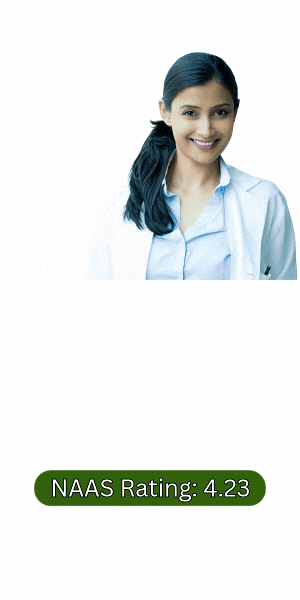
Earlier when agriculture was limited to traditional classrooms there was less scope in it but now with the digital age, online and distance learning in agriculture has emerged as a flexible option for learners and professionals. If someone has to study for sustainable farming, agricultural policy, or biotechnology, they have an online or a hybrid option as many universities now offer distance learning degree and diploma programs which helps in gaining industry-relevant skills irrespective of any other factor.
Agriculture is a field-intensive discipline which makes it difficult to study online due to its practical limitations of lab experiments, soil testing, crop management, and field research. However, it can be done in blended programs as offered by many universities, a mix of online theory classes with field-based training and practical lab work at designated centers.
For example, fully online courses may include diploma and postgraduate diplomas in agri-business or organic farming while bachelors and masters degrees and Ph.D often include on-site components making it more for part time or a hybrid option.
Online and distance learning programs in agriculture are ideal for:
These flexible programs allow learners to study as well as balance their ongoing work without relocating and allowing them to conduct community-based research at local level.
At different levels of study, various courses are offered in the field of agriculture for distance or online education.
At the undergraduate level, diploma programs in areas like organic farming, agricultural marketing, and extension services can be pursued by students. Some universities also offer bachelors courses in hybrid mode. At the postgraduate level, most of the courses eg. M.Sc. programs in Agriculture, Horticulture, or Agronomy, are offered in blended mode while postgraduate diplomas courses e.g. in Agri-Business or Watershed Management, are usually more flexible. For advanced learners or for Ph.D. programs in Agriculture are often offered in hybrid mode which are ideal for research focused individuals as it involves part-time study with periodic campus visits.
These programs follow a typical hybrid learning model which involves online coursework along with on site practical work.
Online coursework is usually delivered through Learning Management Systems (LMS) like Google Classroom or Zoom where students get in touch with knowledge of research methodology, agricultural statistics, and scientific writing. For the practical work, it requires on site work for instance at local farms or Krishi Vigyan Kendras (KVKs). This ensures students gain the necessary hands-on experience.
The research work is under the supervision of university guides for Ph.D. and postgraduate students maintaining academic momentum through monthly meetings, progress reports, and digital submissions. It is to be noted that in some programs on-campus attendance is also required. It can be for attending workshops, lab practicals or thesis defenses.
In India, top universities include Indira Gandhi National Open University (IGNOU) which offers a Ph.D. in Agricultural Extension, along with certificate and diploma courses in organic farming and food safety, ideal for rural students and professionals. Next is Amity University providing learners with a flexible and part time Ph.D. programs in Agri-Economics and Agri-Biotechnology with online coursework and research supervision. Shobhit University, a Meerut-based university, offers an external online and weekend academic support Ph.D. program in Agriculture which is ideal for educators and NGO workers. Annamalai University, a Tamil Nadu-based university, also provides B.Sc. and M.Sc. in Agriculture with hybrid learning options.
Internationally, the University of Reading (UK) offers a hybrid Ph.D. in Agricultural Development and Soil Science with annual campus visits for reviews and workshops while the University of South Africa (UNISA) provides a fully online Ph.D. programs in Agriculture and Environmental Sciences with a flexible and local supervisor support for international candidates. Atlantic International University (AIU) also offers online degrees in agriculture but due to non-recognized accreditation it is not advised to enroll without inquiry.
Though admission requirements vary to institutions but in general for diploma and undergraduate programs, students need 10+2 with either science or agriculture subjects and for postgraduate courses, students must have passed with 55% marks in Bachelor’s degree in Agriculture or a related field.
Ph.D. applicants may be required to pass an entrance exam or interview and must have a Master’s degree in Agriculture or related disciplines with a strong research proposal. To get into Ph.D. programs mainly part time, some institutions ask for work experience or a confirmation letter from a supervisor. However, it is crucial for candidates to verify the recognition of a university it should be either by UGC (India) or other international bodies.
Online and distance learning also has several limitations including;
These programs limit your hands-on experience as they lack access to advanced laboratories for practicals and thesis defenses. People might not follow discipline as self-paced learning requires a high level of self-discipline and time management. Some employers also prefer traditional degrees over online ones due to being recognised by accredited bodies.
It also comes with inconsistency as sometimes mentors are not actively engaged or able to supervise the Ph.D. program. In most cases, campus visits are also required for evaluations, research presentations, or final thesis submission which is not possible due to location factor or distance.
Graduates of online or distance agriculture programs have diverse career options.
If the degree is recognized, one can apply for teaching positions after clearing UGC-NET or equivalent exams in colleges or universities. You may work as a researcher, extension officer, or project manager in any government or NGO-led agricultural programs after meeting the eligibility. One can also notice the growing demand in the AgriTech sector, startups can seek skilled professionals in data-driven and remote farming solutions. Other opportunities include roles in agribusiness consulting, rural policy analysis, or even content creation for publications and platforms which are agriculture focused.
No, it is not recognized in India due to the requirement of practical training. However, some universities offer hybrid models for which you can apply.
Yes but only when recognised by UGC or any other internationally accredited universities/bodies. It is suggested to always verify recognition before applying.
Yes, if you meet the eligibility of the specific position and your degree is recognised by any prestigious body either Indian or international.
Cost may vary depending upon the chosen university. For diploma or PG programs it may cost around ₹30,000 to ₹60,000 annually. For Ph.D. programs it costs ₹1 to ₹2 lakh per year in India.
Ph.D. programs in agriculture and environmental sciences offered by UNISA (University of South Africa) are fully online.
Costs vary from country to country and university offering. For example, in the USA fees for a Master's degree may cost around $20,000 to $50,000 per year, while it costs GBP 15,000 to GBP 30,000 when studying in the UK.
 NAAS Rating: 4.23
NAAS Rating: 4.23  December 2025 Issue
December 2025 Issue  Impact Factor: 6.69
Impact Factor: 6.69  Submit Article
Submit Article 
|
Citation Indices
|
All
|
Since 2020
|
|
Citation
|
6164
|
5117
|
|
h-index
|
31
|
29
|
|
i10-index
|
201
|
165
|
|
Acceptance Rate (By Year)
|
|
|
Year
|
Percentage
|
|
2024
|
11.09%
|
|
2023
|
15.23%
|
|
2022
|
12.81%
|
|
2021
|
10.45%
|
|
2020
|
9.6%
|
|
2019
|
14.3%
|
|
2018
|
17.65%
|
|
2017
|
16.9%
|
|
2016
|
22.9%
|
|
2015
|
26.1%
|